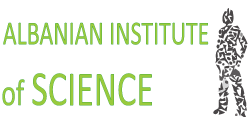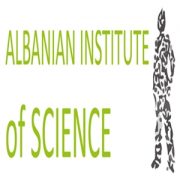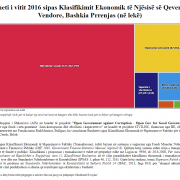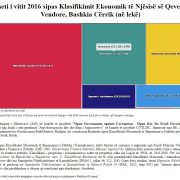Submitted to AKEP on 26.02.2018 – “Opinions about the Document subject to Public Consultation “On Amendments to Regulation No.2, dated 21. 02. 2008”
Dear members of the Steering Board of AKEP,
The non-Government organization Albanian Institute of Science (AIS), registered with the Register of NGOs at Tirana District Court by initial decision No. 3048, dated 28/03/2011, would like to take the opportunity to express its highest considerations for your work and institutions. In response to the Document for Public Consultation “On amendments to Regulation No. 2, dated 21. 02. 2008 “On the registration and administration of domain names nën.al , gov, mil.al, edu.al, com.al, org.al and net.al as amended”, a document published on your official website, where suggestions were expected until 28 February 2018, let us share with you some thoughts, which we consider necessary and of concern. They address mostly aspects related with the activity of the non-governmental sector in terms of being able to use the ‘.al’ space for creating instruments of communication, information, free thought, and civic education.
Wishing you a successful finalization of your regulation amendment process, we hope to contribute by sharing our opinion:
OPINIONS
ON THE DOCUMENT SUBJECT TO PUBLIC CONSULTATION “On amendments to Regulation No. 2, dated 21.02.2008 “On the registration and administration of domain names under .al and under .gov, .mil.al, .edu.al, .com.al, .org.al and .net.al domains”, as amended”.
First of all;
On page 11, AKEP raises the question whether the Regulation may determine a maximum number of 5 to 10 domains for each individual or organization, excluding state institutions.
Page 12. point b. The maximum number of domains allowed under .al, including subdomains, is 5 to 10, on the condition that they start to be used within a 3 to 6 months deadline. The domain registrars have to check whether a domain they register/modify is used within this deadline and within its period of validity. If a domain is found not to be used for 6 months during its valid period, the Registrar classifies that domain as free.
The Constitutional Court has delivered in its jurisprudence that the principle of the rule of law obliges all public bodies to exercise their powers only in the framework of, and based on the Constitutional norm. The legal acts issued by such bodies must be in compliance with the highest legal acts both in their formal and substantial sense. The respect for the hierarchy of the normative acts is an obligation deriving from the principle of the rule of law and the principle of coherence of the legal system (decision no.2, dated 03.02.2010; no.1, dated 12.01.2011; no. 23, dated 08.06.2011; no. 25, dated 28.04.2014 of the Constitutional Court).
Article 4/1 of the Constitution provides that: “The law represents the basis and the limits of the activity of the state”. Further, Article 116 of the Constitution describes the hierarchy of the sources of the law as one of the fundamental values of the rule of law, where the legislative power has a primary role. The description of the hierarchy o acts in the Constitution, as well as the sanctioning of the principle of separation and balancing of powers in how the constitutional bodies exercise their functions, i.e. by issuing normative acts, embodies at its best the principle of the rule of law in a parliamentary system. The Parliament, vested with the sovereign power of creating the primary sources of law, authorizes the issuance of normative acts for materializing its will. Such authorization must adhere to the criteria set forth under Article 118 of the Constitution to be in harmony with the principle of separation and balancing of powers, as well as with the hierarchy of the normative acts sanctioned by Article 7 and Article 116 of the Constitution (decision no.5, dated 5.2.2014 of the Constitutional Court).
Article 118/1 of the Constitution provides that “sublegal acts are issued on the basis of, and for the implementation of laws by the bodies foreseen by the Constitution”. The second paragraph of this article, on the other hand, provides that: “the law must authorize the issuance of the legal acts, identify the body responsible, the issue to be regulated, as well as the principles on the basis of which such acts are issued.”
Such provisions help giving a Constitutional and doctrinarian meaning to the concept of “legal reserve”, through which the normative power of the executive bodies is limited or oriented in regulating certain relations by sublegal acts. Such legal reserve enables a concrete issue already regulated by law to be further detailed by sublegal acts, adhering to the principles and limitations set by law. It is only in this way that the authorization of the lawmaker for issuing sublegal acts may be considered as exercised within the limits of constitutionality.
According to Article 17 of the Constitution, the rights and freedoms of a person may only be limited by law. Referring to the content of Article 17 of the Constitution, the Constitutional Court delivers that the way how this provision is formulated does not give any other bodies the possibility to delegate except for the Assembly as a representative body. The purpose of this article is to make sure that in order to ensure the fulfilment of the criteria in case of limitations, and to provide as comprehensive guarantees as possible, there should be only one competent body, and this body has to be the highest lawmaking body. The expression “only by law” means that in case of a need to limit a right foreseen by the Constitution, then it is only in the discretion of the lawmaker, and not any other bodies, including the Council of Ministers.
The Constitutional Court has delivered that the regulation provided for by Article 17 on the limitation of the rights and freedoms only by law is also related with setting the competence of a concrete body, which in this case is the Assembly. Such an expression refers you to the competence of a lawmaking body, and the issuance of additional acts for regulating such relations, affects the competences of this body. Any opposite interpretation is certainly an invalidation of the guarantee given by the Constitution for the protection of human rights and freedoms, and would effectively affect such rights and freedoms. The same conclusion is also reached referring to the word “only” mentioned in Articles 11/3 and 17 of the Constitution. It is not by accident that such word is used, it is rather chosen to show that such restrictions/limitations may not be introduced by any other means than the law.
By setting a certain number of domains (5-10) for each applicant, AKEP has limited the rights, especially when such fact is seen in the context of the current unlimited possibility in this regard.
The rights of such nature must only be limited by law, according to Article 17 of the Constitution, and not by the Regulation of AKEP, which is a sublegal act. If this, however, happens, it would mean that AKEP has taken the exclusive competence of the Assembly, regulating such limitation in such a way. Therefore, any acts issued afterwards by AKEP in this regard, would be absolutely invalid. Besides, such acts would even be against the Constitutional norm.
Example: Our organization has more than ten domains (subdomains) on .al. the limitation of our right of ownership (to not more than 10), limits our possibility to use instruments of communication, information, and free speech, which we have so far used lawfully. The obligation to close any of our domains as a result of a restrictive regulation like this, would constitute a case of censorship, and affect our right to operate in line with the objectives and mission of a non-governmental organization. In addition, we are already working on several projects, where we intend to bring the certain words in different (more than 10) EU languages, using the .al domain. This would not be possible with the proposed regulation making it impossible to use a website in several languages, and domains and subdomains adopted to the content.
Secondly,
The ownership of so many .al domains by the Registrar itself, represents a kind of obstacle to the freedom of the subjects and individuals in registering a domain name, especially in the case of those, who own registered trademarks and patents.
This argument is not grounded on any facts, or scientific or empirical research. The Dictionary of the Albanian Language of 2006, a publication of the Academy of Science of Albania and the Institute of Linguistics and Literature carries 48 000 Albanian words (not including their declination or conjugation suffixes) and no technical or scientific terms. Domains, though, may even come in foreign languages or acronyms even though on the .al domain.
This is also not justified, and causes time limitations to the purpose for which someone becomes a (domain) owner.
Protection of trademarks and patents can be best regulated legally (the judicial doctrine also offers some solutions), and there is no reason for creating just number limitations.
The ownership of this number of .al domains by the Registrar represents a kind of obstacle to the freedom of the subjects and individuals for registering a domain name, especially those, who own registered trademarks and patents.
AKEP also notes that when a company or individual fails to use a new .al domain for justified and proven technical reasons, the company or individual must be recognized the right of renewal for the same term, but not more than once, provided that it (the company or individual) uses it within 3 up to 6 months after renewal.
The argument above given in the Draft Decision is not valid. In order to first conclude that this “constitutes an obstacle to the freedom of subjects and individuals for registering a domain name”, it must first identified the maximum number of .al. domains that could be registered. This number must then be compared with the number of existing domains already registered on .al. If such comparison shows violation of the principle of proportionality, such a step by the state bodies could be legitimized.
The draft decision, however, does not contain any data of this kind. Besides, logically specking, the number of combination of words that could take the suffix .al would be endless even if we refer to the Albanian dictionary. Therefore, the introduction of such restriction makes no sense.
Besides, for the above reasons, this restriction may not be introduced in a sublegal act, but only in a law.
In addition, AKEP generates money from the ownership of these domains. Therefore, it makes no sense why this should also be restricted.
As far as the operation of the domain(s), this also requires some legal explanation. For as long as someone registers, keeps, and pays for a domain, it is their right to use that domain or not. The domain could not be set in operation for many unpredictable reasons, but it is still up to them to decide to use it or not. The only condition that both parties must meet is the payment of the relevant fee. Only in case of failure to pay such fee, may AKEP take back the domain and make it free.
Example: Our organization spent one year to raise fund and 6-8 months to develop the web and data catalogue to make its data catalogue, known as Open Data Albania, operate. This is the optimal planning and implementation time for each of our databases of open and transparent data. The proposed restriction would be regressive and unsubstantiated.
Thirdly,
Point 7, pages 13-14 Based on the complaints and concerns raised with AKEP by applicants or owners of .al domains and subdomains, AKEP thinks that there is a need for introducing a special Annex to Regulation No.2, or to expand the current Article 27 of Regulation No. 2 on resolution of disputes, clarifying that AKEP has the right to solve disputes when such disputes are related with rules issued by AKEP, while regarding any other disputes, the parties may address the competent bodies.
Based on the Code of Administrative Procedure, AKEP may not exercise this competence. Such competence may be exercised by a supervisory AKEP body, which does not actually exist. Therefore, in case of any disputed related with acts issued by AKEP, the competent body is the administrative court.
On the other hand, Law No. 9918, dated 19.05.2008 “On electronic communication in the Republic of Albania”, its Article 8 on the Competencies of AKEP, does not provide for any such competencies. The distinction between disputes related with acts issued by AKEP and other types of disputes is artificial and inapplicable in practice. It is difficult to understand the words rules issued by AKEP, for as long as even AKEP own decisions of will also be based on documents issued by other institutions.
Fourthly,
5. In Annex 2, “List of Reserved Names”, the following separate point shall be added: Names of domains under .al, which correspond accurately with names of subjects, which are known due to the activity they exercise and due to their registration in line with the applicable legislation in offices, institutions, authorities, such as the National Business Centre (NBC), or registrations made for purposes of disclosing or protecting industrial property data, specific names, or else, shall constitute reserved domains.
The prevailing criterion (even if accepted as such) may not be determined by sublegal acts. This, and any other criteria, would be legally valid only if they are provided for in a legal, and not sublegal, act.
In addition, the law, or any bylaws issued through exclusive delegation, must also set detailed procedural rules on the stages, modalities, and review of complaints. It should also explain how evidence or conformation are to be administered or obtained by AKEP from other institutions. The Albanian legislation contains many practices, which are exhaustive as long as the procedural aspect for an administrative body to reach a decision is concerned.
On the other hand, the registration of a subject with a public register, e.g. NBC, does not mean that this (the name) is a commercial trademark of that subject. The register of commercial trademarks is a different type of register, which creates rights.
Registration with the NBC does not create rights. It simply has some publication effects for third parties. This means that as long as such register has only such publication effects, it may not be offered any additional protection, or any other qualification in the register of .al domains as proposed in the draft decision.
This draft decision considers all public registers as equal, and makes no distinction between those of a declarative nature and others, which create rights for the registered subjects. Therefore, it is not justifiable why registration with the NBC prevails and should be respected in every other registration, while the NBC law itself has not provided for this, but has rather respected the declarative nature of this register.
Fifthly,
– The draft decision must be drafted in line with the recommending acts of the Albanian state applicable to the drafting of regular acts. The Ministry of Justice has issued a special manual for this purpose (Manual on Law Drafting). This Manual is equally applicable to the drafting of sublegal acts, as in this case. That is why the proposed text must have a clear structure, show clearly the proposed changes, and be accompanied by a report which explains why such changes are necessary, etc.
– The draft decision must also be accompanied by a table on the transposition of Aquis Communaitaire in this area. A table must be prepared for this purpose, indicating the EU Directives (if applicable) and compliance reached though the proposed text, as well as the relevant reasons.
-Another added value of this proposed act would be comparison with the experience of other countries in the region, which have already gone through similar stages of development of their electronic communication, and their approach to the same issues.




